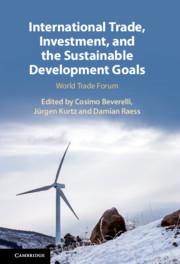Book contents
- International Trade, Investment, and the Sustainable Development Goals
- International Trade, Investment, and the Sustainable Development Goals
- Copyright page
- Contents
- Figures
- Tables
- Contributors
- Preface
- Introduction
- Part I Penetration and Diffusion of the Sustainable Development Goals
- 1 A Cross-Cutting Legal Analysis of the European Union Preferential Trade Agreements’ Chapters on Sustainable Development
- 2 The European Union’s New International Investment Policy and the United Nation’s Sustainable Development Goals
- 3 Natural Resources Management in the Sustainable Development Goals Era
- Part II Top-Down: Public Approaches to Achieving the Sustainable Development Goals
- Part III Bottom-Up: Private Sector and Civil Society Initiatives on the Sustainable Development Goals
- Index
- References
3 - Natural Resources Management in the Sustainable Development Goals Era
Insights from World Trade Organization Case Law
from Part I - Penetration and Diffusion of the Sustainable Development Goals
Published online by Cambridge University Press: 18 September 2020
- International Trade, Investment, and the Sustainable Development Goals
- International Trade, Investment, and the Sustainable Development Goals
- Copyright page
- Contents
- Figures
- Tables
- Contributors
- Preface
- Introduction
- Part I Penetration and Diffusion of the Sustainable Development Goals
- 1 A Cross-Cutting Legal Analysis of the European Union Preferential Trade Agreements’ Chapters on Sustainable Development
- 2 The European Union’s New International Investment Policy and the United Nation’s Sustainable Development Goals
- 3 Natural Resources Management in the Sustainable Development Goals Era
- Part II Top-Down: Public Approaches to Achieving the Sustainable Development Goals
- Part III Bottom-Up: Private Sector and Civil Society Initiatives on the Sustainable Development Goals
- Index
- References
Summary
This chapter assesses whether the law and practice of the WTO have been sufficiently aligning with the international law principle of sustainable use of natural resources as enshrined in the Sustainable Development Goals (SDGs) and recognized in the International Law Association New Delhi Declaration. Focusing on how relevant WTO rules and exceptions have been interpreted in recent WTO cases revolving around the notion of conservation under Article XX(g) General Agreement on Tariffs and Trade (GATT) and Article 2 Technical Barriers to Trade, it finds that such provisions have been interpreted in a way that preserves sufficient flexibility for members to pursue sustainable natural resources management goals through trade-related policy instruments (even when they are unilateral measures with extraterritorial reach). Interestingly enough from a sustainable natural resources management standpoint, the chapter stresses that WTO dispute settlement bodies have not only consistently broadened the reach of the GATT conservation exception in line with the principle of sustainable use of natural resources, but also significantly preserved the ‘environmental’ (i.e. conservation-related) connotation of sustainable natural resources management.
Keywords
- Type
- Chapter
- Information
- International Trade, Investment, and the Sustainable Development GoalsWorld Trade Forum, pp. 76 - 108Publisher: Cambridge University PressPrint publication year: 2020

